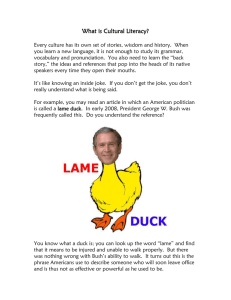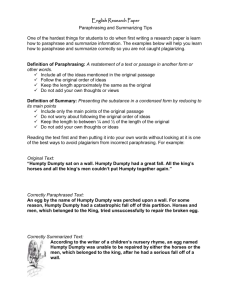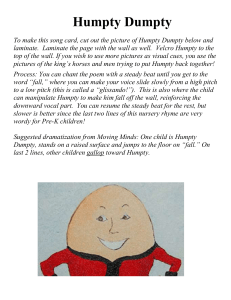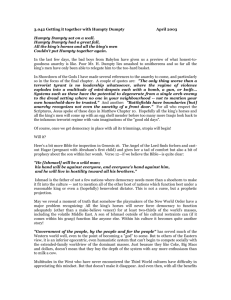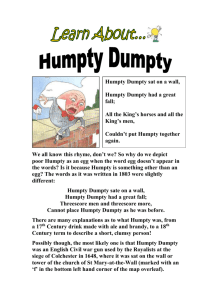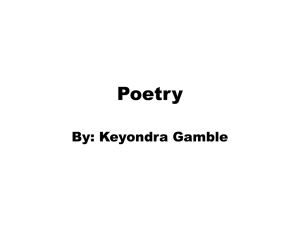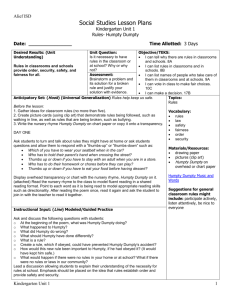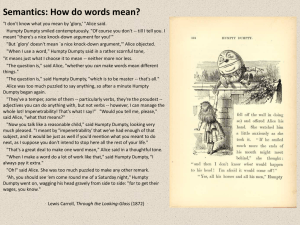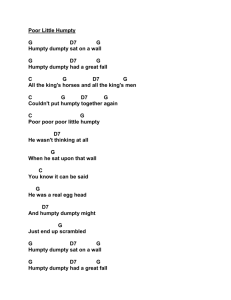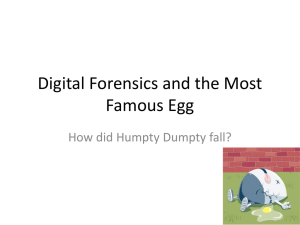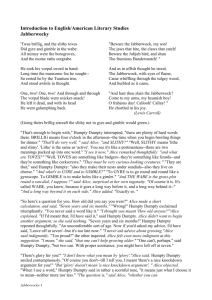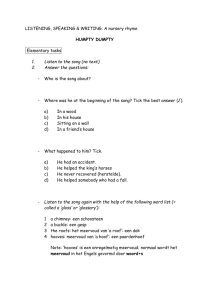Humpty Dumpty sat on a wall Humpty Dumpty had a great fall. All
advertisement
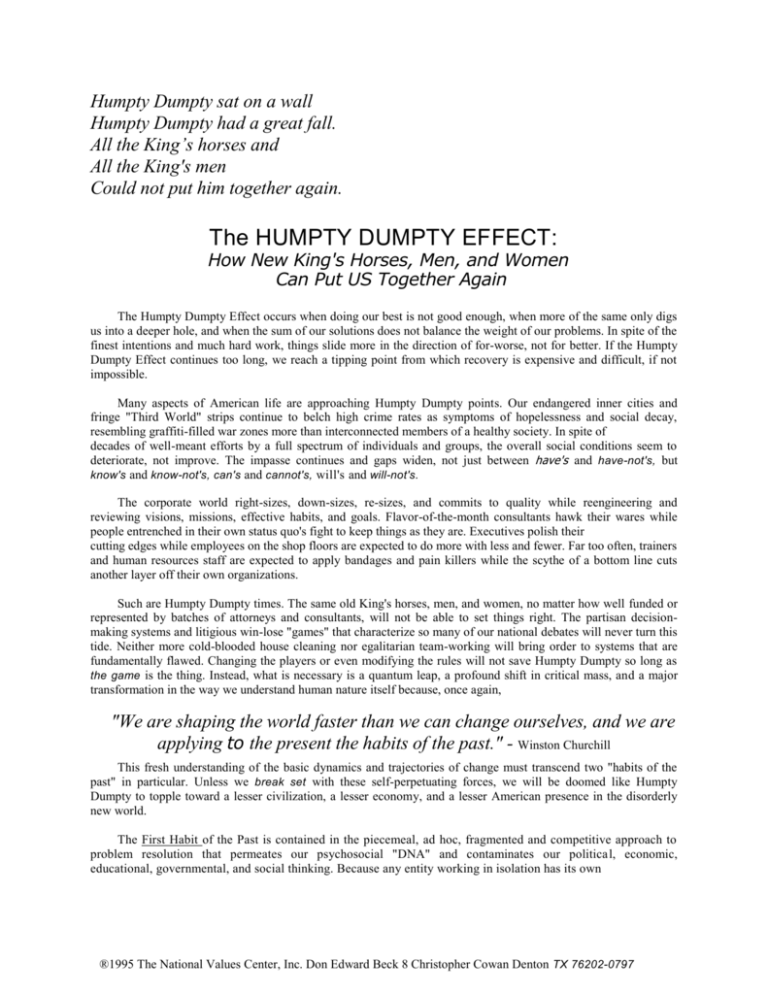
Humpty Dumpty sat on a wall Humpty Dumpty had a great fall. All the King’s horses and All the King's men Could not put him together again. The HUMPTY DUMPTY EFFECT: How New King's Horses, Men, and Women Can Put US Together Again The Humpty Dumpty Effect occurs when doing our best is not good enough, when more of the same only digs us into a deeper hole, and when the sum of our solutions does not balance the weight of our problems. In spite of the finest intentions and much hard work, things slide more in the direction of for-worse, not for better. If the Humpty Dumpty Effect continues too long, we reach a tipping point from which recovery is expensive and difficult, if not impossible. Many aspects of American life are approaching Humpty Dumpty points. Our endangered inner cities and fringe "Third World" strips continue to belch high crime rates as symptoms of hopelessness and social decay, resembling graffiti-filled war zones more than interconnected members of a healthy society. In spite of decades of well-meant efforts by a full spectrum of individuals and groups, the overall social conditions seem to deteriorate, not improve. The impasse continues and gaps widen, not just between have's and have-not's, but know's and know-not's, can's and cannot's, will's and will-not's. The corporate world right-sizes, down-sizes, re-sizes, and commits to quality while reengineering and reviewing visions, missions, effective habits, and goals. Flavor-of-the-month consultants hawk their wares while people entrenched in their own status quo's fight to keep things as they are. Executives polish their cutting edges while employees on the shop floors are expected to do more with less and fewer. Far too often, trainers and human resources staff are expected to apply bandages and pain killers while the scythe of a bottom line cuts another layer off their own organizations. Such are Humpty Dumpty times. The same old King's horses, men, and women, no matter how well funded or represented by batches of attorneys and consultants, will not be able to set things right. The partisan decisionmaking systems and litigious win-lose "games" that characterize so many of our national debates will never turn this tide. Neither more cold-blooded house cleaning nor egalitarian team-working will bring order to systems that are fundamentally flawed. Changing the players or even modifying the rules will not save Humpty Dumpty so long as the game is the thing. Instead, what is necessary is a quantum leap, a profound shift in critical mass, and a major transformation in the way we understand human nature itself because, once again, "We are shaping the world faster than we can change ourselves, and we are applying to the present the habits of the past." - Winston Churchill This fresh understanding of the basic dynamics and trajectories of change must transcend two "habits of the past" in particular. Unless we break set with these self-perpetuating forces, we will be doomed like Humpty Dumpty to topple toward a lesser civilization, a lesser economy, and a lesser American presence in the disorderly new world. The First Habit of the Past is contained in the piecemeal, ad hoc, fragmented and competitive approach to problem resolution that permeates our psychosocial "DNA" and contaminates our politica l, economic, educational, governmental, and social thinking. Because any entity working in isolation has its own ®1995 The National Values Center, Inc. Don Edward Beck 8 Christopher Cowan Denton TX 76202-0797 worldview, agenda, and self-sustaining bottom-line, it will act in a fashion to preserve itself and fulfill its perceived destiny. It will try to keep itself in business doing what it best knows how to do, forcing its set of solutions onto whatever problem arises like a hammer looking for nails, and answering only those questions for which it already has answers in stock. Alternative perspectives become adversaries to be silenced and defeated, not additive contributors to a new whole greater than its parts. Thus, instead of shifting the critical mass from negative to positive in many urban settings, these isolated , initiatives - in housing, education, jobs, public safety, the environment - are not only ineffective in stemming the for-worse tide on their own; they often negate each other, cancel each other out and, in aggregate, add energy to the spiraling-down effect. The result of disjointed "good ideas" is usually social junk heaps filled with the wreckage of alphabet agencies and expensive social programs, flashy public relations efforts touting sparse results, and naive business ventures doomed in short order to corruption or failure only va lidating the cynicism. The Second Habit of the Past is reflected in the manner these complex problems are overlaid with racial and ethnic poisons that lead to suspicious questions about every motive, principles compromised in every initiative, and sharp polarizing of the very elements which should be working in concert with each other. Racial stereotypes (viruses of tire mind), racial prejudices (toxins of tire heart), and racial discrimination (symptoms of tire poisons) will continue to frustrate America if we do not deal genuinely and promptly with the so-called "underclass" of have-not's in our society and their feelings of exclusion into backwaters of the mainstream. We are now entering a third stage after the "Civil War - Civil Rights" sequence. This is the phase of Civil Transformation, a dynamic process of building in the evolutionary steps and stages required to ratchet the minds of people and groups through levels of complexity to participate in the democratic process. For example, if the "pro-Affirmative Action" position is seen as the thesis, and the recent "anti-Affirmative Action" response is a natural antithesis, what is now lacking in the new synthesis. This coordinated self action must contain elements from both thesis and antithesis, but then add elements to give it great power and range in addressing the problems that both trends have created. It must reach into the deepest dynamics of humans and our nature, far deeper than race or gender or ethnicity, to close the gaps that separate us from opportunities to lead for-better lives. As Americans, we are confronted with problems today the likes of which we have never encountered in our history. Clearly, we have reached a dangerous impasse in many of our efforts to improve the quality of life in America. There are dangerous forces which may rip us apart from the inside at the very time we believe we have eliminated the outside threat represented by the now-defunct Soviet Union, the energizing enemy which held us together for so long. Unless the inside is "fixed" quickly and put on a more permanent pathway to a better, more civilized future, we must be prepared to live in cocoons and seek safety hiding behind protective walls. Unless the widening gaps ®1995 The National Values Center, Inc. Don Edward Beck 8 Christopher Cowan Denton TX 76202-0797 begin to close now, our children's children will have to explore a virtual "good life" on the Internet or experience "the American dream" in cyberspace because it will be too dangerous to play outside. Many of today's young minds will be incapable of handling 21" century jobs, not because they lack intelligence but because their intelligences will never have been awakened. Such is an America no one wants, but one which failure to tend to the Humpty Dumpty Effect will produce. The best solutions lie in (I) creating a new synthesis for understanding the hierarchies of complexity (not political power, economic dominance, or even info-chic) that exist beneath the surface of our society, and (2) constructing a new synergy of efforts, resources, and programs through collaborative initiatives in the public and private sectors using a creative co-design methodology (such as the Value Engineering process). Then we can bring about (3) a new focus for these constructive ideas and packages and aim them, laser-like, on the huge gaps and asymmetries that plague and distort our social order and put this culture in jeopardy. These developmental disparities build the walls that keep Humpty Dumpty at-risk, and they must be breached right now. The individual initiatives, like separate fibers, must be woven together in the form of a spiral-like coil where everything connects to everything else. Only fuller attention to the different world views and simultaneous (but diverse) realities that share the spiral of today's America can produce the power and precision to mesh and synergize the positive forces. This is the ONLY WAY to approach these needed areas of development and close gaps. Continued reliance on the Habits of the Past blinds Humpty Dumpty to his predicament and dooms him to fragmentation. More-of-the-same is both too little and too late. On the other hand, an integrated, aligned, and well coordinated policy of human development implemented through programs tailored to weave a new, stronger American fabric can set him upright and set our nation on a vibrant, fresh, possibility-filled course into the next century. ®1995 The National Values Center, Inc. Don Edward Beck 8 Christopher Cowan Denton TX 76202-0797
